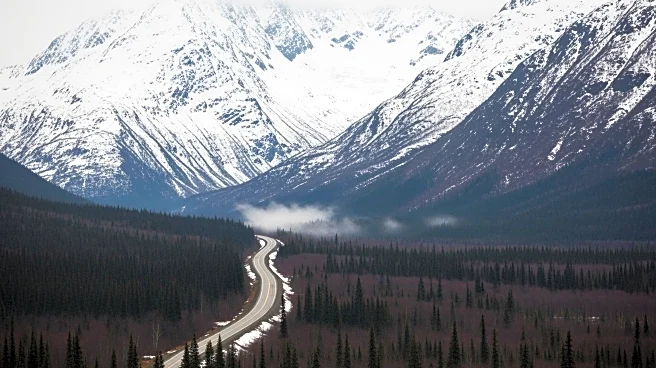What's Happening?
The Trump administration has announced its decision to proceed with a controversial land deal that will allow the construction of a road through the Izembek National Wildlife Refuge in southwest Alaska. This decision is part of a broader initiative to enhance
energy development in the region, which also includes opening 1.56 million acres of the Arctic National Wildlife Refuge to oil and gas drilling. The road is intended to provide better access for the residents of King Cove, a remote fishing village, to reach medical facilities in emergencies. Interior Secretary Doug Burgum emphasized the importance of prioritizing human health while also protecting wildlife, stating that the decision balances both needs. However, environmentalists and some Indigenous groups have expressed concerns about the potential impact on the pristine environment and its wildlife, including migratory birds and caribou.
Why It's Important?
The decision to build a road through the Izembek National Wildlife Refuge highlights the ongoing debate between development and conservation. For the residents of King Cove, the road promises improved access to healthcare, potentially saving lives in emergencies. However, environmentalists argue that the road could disrupt the delicate ecosystem, introducing pollution and human activity to an area that serves as a critical habitat for various species. This development reflects broader tensions in U.S. policy regarding energy independence and environmental protection, with potential implications for future land use and conservation efforts across the country.
What's Next?
The construction of the road is likely to face legal challenges from environmental groups seeking to protect the refuge's ecosystem. These groups may argue that the road violates environmental laws and could set a precedent for future development in protected areas. The Trump administration's broader energy development plans in Alaska may also encounter opposition from conservationists and Indigenous communities. As the situation unfolds, stakeholders on both sides will likely engage in legal and public advocacy efforts to influence the outcome.
Beyond the Headlines
The decision to build the road through the Izembek National Wildlife Refuge raises ethical questions about the prioritization of human needs over environmental conservation. It also highlights the complex relationship between federal policies and Indigenous rights, as the King Cove Corporation, a Native Alaska group, is involved in the land exchange deal. The long-term impact of this decision could influence future policies on land use and conservation, potentially affecting how similar conflicts are resolved in other parts of the United States.

















